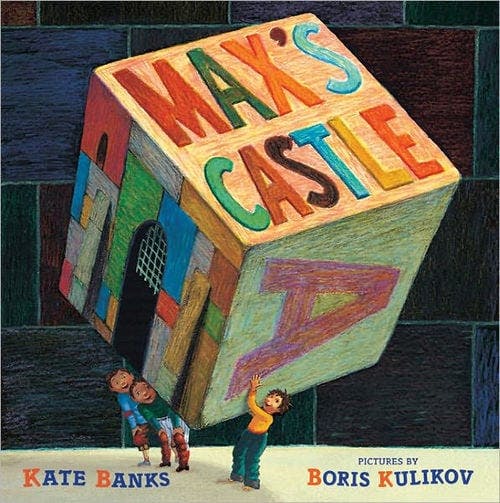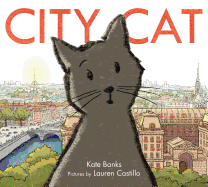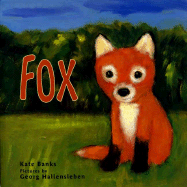

Max's Castle
Buy from other retailers
What Does Bookroo Think of Max's Castle
Max’s brothers think he’s boring for staying in with his letter blocks when they’re planning to go out and play. But when they see Max use the letter blocks and imagination to do some impressive world building, they decide to join in the fun, and together they build castles, encounter pirates, and escape dungeons. As she did in Max’s Words, Banks will thrill readers with Max’s knack for wordsmithing; however, this time, it is not with Max’s ability to string words together into captivating stories, but instead to command a tale with letter blocks: “There are no weapons in my kingdom . . . I will turn your SWORD into WORDS.” Kulikov’s depiction of many illustrations out of letter blocks that also spell the word is a creative touch that allows Max to “twist” letter blocks to turn, for example, “battle” into “babble.” While the cleverness of the wordsmithing will only be appreciated by readers who can spell, kids of all ages will recognize letter blocks and enjoy seeing a traditional toy at the center of the story. It’s a praiseworthy detail that when Max’s brothers decide to join him, they follow Max’s lead and play with him, rather than dominating the play as older siblings. Kulikov’s distinct illustration style, influenced by his background in set and costume design, veers from the romanticized portrayals of adventure in much of children’s literature and gives Max’s story a theatrical feel. Characters are placed like actors on stage, and illustrations are laid out on the page as an audience would view a play.
What Kind of Book is Max's Castle
Reviews
Max's Castle is a really clever book and sure to fascinate any early reader. The book brilliantly explores words by mixing around or swapping the letters in one word to create an amalgamation of similar words and anagrams. Early readers are sure to enjoy, for example, that by simply adding an "l" block to the word "adder," Max and his three brothers smartly create a ladder to escape from the dangerous adder in the dungeon of the castle. Kate Banks and Boris Kulikov have some fun with the illustrations and anagrams surprising us with threatening pirates in one page before turning "pirates" into harmless "rat pies" in the next page. This book is sure to delight readers with its wit and imaginative exploration of letters.
Max's Castle is clever and enjoyable to read. Much of the brilliance will be missed by children, but this is a book that can grow with a child throughout the years as they discover more of the puzzles hidden within the pages.
Book Lists That Include Max's Castle
The Creatives Behind the Book
When I am asked what I do for a job, I am often tempted to say that I don’t work. That’s because I am lucky enough to do something I love for a living. For me my writing has been a place where head meets heart and that is the place I wish to take my readers—whether it be an outer journey or an inner journey. Because that’s the place of realization where anything is possible. When I’m not writing or practicing therapy, I love playing the piano, doing pottery, puttering around outdoors, and cooking. I especially like making birthday cakes, but I hate cleaning up. And I love being with children. I love watching them and listening to them as much as I love writing for them. I am a huge fan of the Boston Red sox, the brain and what it can do, and imagination—all of which have limitless potential and can accomplish the seemingly impossible.
Boris was born in Russia, and graduated from The Institute of Theater, Music and Cinema in St. Petersburg. He emigrated to the United States in 1997 and his career there began as an illustrator for the New York Times Book Review. Boris currently lives in Brooklyn, NY with his wife Yelena Romanova, who is an author and two sons Max and Andre.
Trivia to Know About Max's Castle
What Has Kate Banks Said About This Book
Nothing yet! Let Kate Banks know that you want to hear from them about their book.
What Has Boris Kulikov Said About This Book
Nothing yet! Let Boris Kulikov know that you want to hear from them about their book.
More Books From These Creatives
Max's Words Series
Similar Books to Max's Castle
Book Details
- ISBN
- 9780374399191
- Publication Date
- October 25, 2011
- Publisher
- Farrar, Straus and Giroux (BYR)
- Original Publication Date
- October 25, 2011
- Page Count
- 40
- Word Count
- 722
- Audience
- Picture
- Reading Age
- 4 - 8 years
- Lib. of Congress (LCCN)
- 2010021388
- Est. Lexile® Level
- ~361L
- Est. Fountas & Pinnell Level
- ~K
- ATOS® Book Level
- 2.6
- Accelerated Reader® Points
- 0.5
- Accelerated Reader Quiz
- 147767
- Accelerated Reader Interest Level
- LG
Contribute to this page
More than halfway there—keep going!
Just the barebones.
Are you the author or illustrator? Claim your book.








































